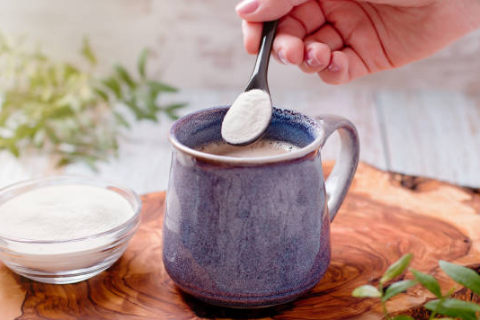Collagen is a naturally occurring protein that makes up about 30% of the body’s total protein. It provides structure, support, and strength to skin, muscles, tendons, and other connective tissues.
As we age, our bodies produce less collagen, which can lead to visible signs of aging and joint stiffness. That’s where collagen supplements may come in handy.
Recommended Daily Intake of Collagen
Taking 2.5 to 15 grams of hydrolyzed collagen daily for up to 12 weeks is considered safe and potentially beneficial. Hydrolyzed collagen—also known as collagen peptides—is broken down into smaller amino acid chains, making it easier for your body to absorb.
The ideal dose depends on your health goals:
-
Lower doses (2.5–5g) may help maintain healthy skin.
-
Moderate doses (5–10g) are often recommended for joint and bone health.
-
Higher doses (up to 15g) may support muscle mass and strength.
There’s also undeniatured type II collagen, which typically comes from chicken sternum cartilage and hasn’t been heat-processed or broken down. This form may support joint health at doses as low as 40 mg.

Why People Take Collagen Supplements
Your body naturally makes collagen from amino acids found in protein-rich foods. But collagen production starts to slow down in your mid-to-late 20s. By the time you’re 40, you may lose about 1% of your collagen each year. By age 80, collagen levels can be significantly reduced.
Lifestyle factors like alcohol consumption, smoking, lack of exercise, sun exposure, menopause, and autoimmune conditions like arthritis can speed up collagen loss even more.
While foods like bone broth and fish skin contain collagen, they’re not always part of everyone’s daily diet. That’s why supplements can be a convenient option.
Collagen supplements may support:
-
Bone Health: Collagen gives bones their structure. Loss of collagen can lead to decreased bone density and conditions like osteoporosis.
-
Skin Health: This is the most well-supported benefit. Studies show that collagen may improve skin elasticity, hydration, and reduce wrinkles and roughness. It also plays a role in wound healing.
-
Joint Pain Relief: Supplemental collagen may build up in cartilage and stimulate your body to produce more collagen in tissues, helping reduce pain and stiffness from osteoarthritis.
-
Muscle Growth & Recovery: Collagen contains glycine, an amino acid involved in creatine production, which supports athletic performance and muscle development.
If you’re already getting enough protein and nutrients that support collagen production—like vitamin C, zinc, and copper—you may not need a supplement.
Types of Collagen Supplements & How to Choose
Collagen supplements come in several forms: pills, capsules, and powders. They’re sourced from bovine (cow), chicken, fish, and even egg membranes.
Most collagen supplements are hydrolyzed, meaning they’re broken into smaller peptides for easier absorption. Undenatured type II collagen is the exception—this form stays intact and works by interacting with the immune system during digestion, which may help reduce inflammation and support joint health.
Choosing the best collagen supplement depends on your goals:
-
Type I & III collagen is best for skin, hair, and nails.
-
Type II collagen is more suited for joint support.
-
Multi-collagen blends provide broader benefits by combining several types.
There are also vegan collagen boosters made from engineered yeast or bacteria. Most of these don’t actually contain collagen but offer amino acids, vitamins, and minerals that help your body make its own collagen.

